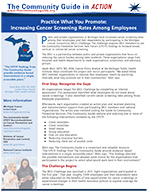Practice What You Promote: Increasing Cancer Screening Rates Among Employees
Summary
 The Michigan Cancer Consortium challenged its member organizations to increase cancer screening rates among their employees. A wide variety of organizations large and small, rural and urban, hospitals and health departments, and trade organizations were able to improve cancer screening rates by using Task Force findings. (Released 2015)
The Michigan Cancer Consortium challenged its member organizations to increase cancer screening rates among their employees. A wide variety of organizations large and small, rural and urban, hospitals and health departments, and trade organizations were able to improve cancer screening rates by using Task Force findings. (Released 2015)Lessons Learned
- Size does not matter. A wide variety of organizations large and small, rural and urban, hospitals and health departments, and trade organizations were able to improve cancer screening rates for employees by using evidence-based strategies.
- Build on existing partnerships. Once trust has been established, maintain it. Trust was essential since many organizations were concerned about protecting employee privacy.
- Find the right person to talk to. Much of the initial promotion of the MCC Challenge was targeted to human resources departments since they could make the needed connections and changes.
Story
The MCC is a partnership between public and private organizations that focus on reducing the cancer burden among state residents. These organizations range from hospitals and health departments to trade organizations, universities, and advocacy groups.
Sarah Mott, MPH, MS, RDN, Cancer Policy Analyst at the Michigan Public Health Institute, helps coordinate the project and recruit participants. “We asked fellow MCC member-organizations to improve their employees’ health by practicing internally what they promote out in their communities,” Mott says.
First Step: Recognize the Gaps
All organizations began the MCC Challenge by completing an internal assessment. This assessment identified what employees do not know about cancer screenings. It also identified current cancer screening rates among those employee populations.
Afterwards, each organization created an action plan and received planning and implementation support from participating MCC members and national organizations. The action plan involved visiting the Guide to Community Preventive Services (The Community Guide) website and selecting one or more of the following interventions reviewed by the Task Force:
- Client reminders (breast, cervical, colorectal)
- Client incentives (breast, cervical, colorectal)
- Small media (breast, cervical, colorectal)
- Group education (breast, cervical, colorectal)
- One-on-one education (breast, cervical, colorectal)
- Reducing structural barriers (breast, cervical, colorectal)
- Reducing client out-of-pocket costs (breast, cervical, colorectal)
Mott says The Community Guide is a convenient and valuable resource. “The Task Force findings from The Community Guide provide evidence-based interventions in a single, accessible place,” Mott says. “The findings directed the possible interventions and allowed some choice for the organizations that participated in the project to select what would work best in their environment.”
The Challenge Begins
The MCC Challenge was launched in 2011. Eight organizations participated in the first year.* That year, roughly 7,000 employees and their dependents were either educated on the benefits of and opportunities for cancer screenings or experienced changes in their health insurance policies to expand coverage for cancer screenings.
The same held true for about 5,000 employees and dependents in the project’s second year. Five of the eight organizations from the first year continued participating the second year and two new organizations joined. The MCC Challenge is supported, in part, by funding from the Centers for Disease Control and Prevention’s National Comprehensive Cancer Control Program. Three organizations who had participated in previous years, also participated in the third year.
They were encouraged to continue their work from prior action plans, however, the organizations were required to use client reminders as an intervention strategy for colorectal cancer (CRC) screening. The organizations used the Make it Your Own (www.miyoworks.org) web tool to create the reminder postcards, with some financial support for printing and mailing. The MCC Challenge shifted focus to client reminders for colorectal cancer after a pilot project with the National Cancer Institute and the Make it Your Own tool increased cancer screening rates.
In the third year, those three organizations sent more than 800 total colorectal cancer screening reminder postcards to clients. As a result, one of the organization’s CRC screening rate increased from 67 percent to 88 percent. Another organization increased its CRC screening rate from 38 percent to 45 percent.
The third organization focused its reminder postcards on clients who were overdue for a CRC screening test. Twenty-five percent of that overdue population completed a CRC screening test within one year of the project.
Keep Things Going
In 2012, the Michigan Cancer Consortium was awarded first place in the Public Health Foundation’s I’m Your Community Guide Contest. The three organizations that best used the findings on The Community Guide website to improve health in their communities won cash prizes.
Now in its fourth year, the MCC Challenge continues with a focus on client reminders for cancer screening. A total of four organizations are participating now two organizations from year three and two physician practices. Client reminders are being sent for colorectal, breast, and cervical cancers.
*The size and additional details about each organization were withheld to protect identity.
More Information
Community Preventive Services Task Force findings referred to in this story:
The Community Guide: Task Force Findings on Cancer Prevention and Control
- Cancer Screening: Client Reminders (breast, cervical, colorectal)
- Cancer Screening: Client Incentives (breast, cervical, colorectal)
- Cancer Screening: Small Media Targeting Clients (breast, cervical, colorectal)
- Cancer Screening: Group Education for Clients (breast, cervical, colorectal)
- Cancer Screening: One-on-One Education for Clients (breast, cervical, colorectal)
- Cancer Screening: Reducing Structural Barriers for Clients (breast, cervical, colorectal)
- Cancer Screening: Reducing Client Out-of-Pocket Costs (breast, cervical, colorectal)